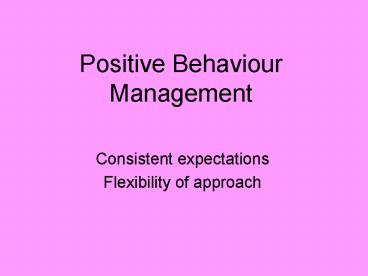Positive Behaviour Management - PowerPoint PPT Presentation
1 / 7
Title:
Positive Behaviour Management
Description:
To think about why students misbehave. To think about how our actions impact the ... To have shared some behaviour management techniques. To have thought ... – PowerPoint PPT presentation
Number of Views:934
Avg rating:3.0/5.0
Title: Positive Behaviour Management
1
Positive Behaviour Management
- Consistent expectations
- Flexibility of approach
2
Session Aims
- To think about why students misbehave
- To think about how our actions impact the
behaviour in our classrooms - To have shared some behaviour management
techniques - To have thought about some specific students
3
Why do students misbehave?
- Inappropriate work set
- Boredom
- Attention seeking
- Avoidance of failure
- Low self-esteem
- Problems at home
- Lack of social skills/emotional intelligence
- Chemical Imbalance
- Our behaviour
4
How does our behaviour impact the students?
Aggressive Passive Assertive
5
Classic Behaviour Techniques
- Take-up Time
- Cool-off Time
- The Broken Record
- The Pre-emptive Thanks
- The Look
- Nameless praise
- Name - Pause - Instruction
- The Pregnant Pause
- Physical Proximity
6
Top tips for positive behaviour management.
- Model the behaviour you want to see
- Keep basic respect intact and protect the
students self esteem. - Give the students choice but always follow
through with sanctions. - Catch them being good and reward them for it.
- Separate the behaviour from the person.
- Plan for positive behaviour.
- Never rise to their anger, stay calm and firm
with words and actions. - Be clear with words, no ambiguity.
- Never take it personally.
- Always end a conversation on a positive note ( if
possible ).
7
Using the school structure
Head of department
Classroom teacher Review your expectations and
communicate them again if necessary Have a
clear sanction and reward structure It is your
responsibility to deal With issues in your
classroom in The first instance
Head of year































